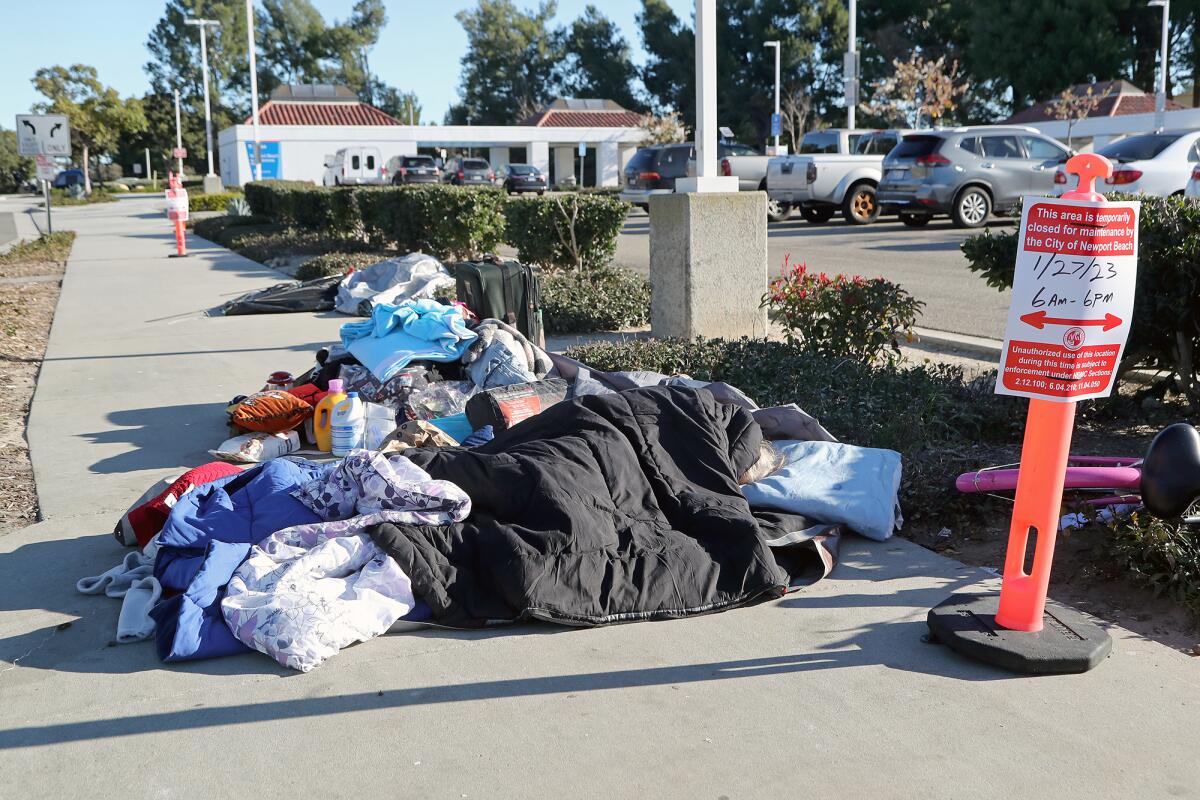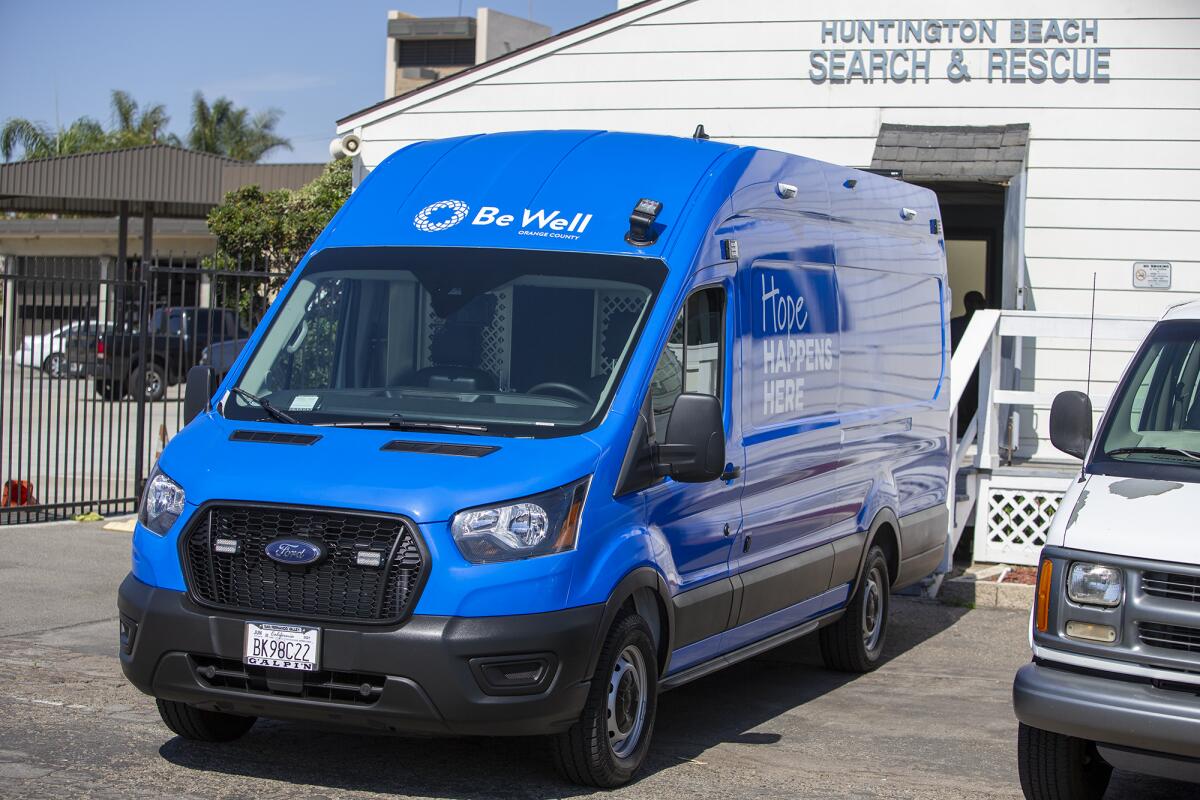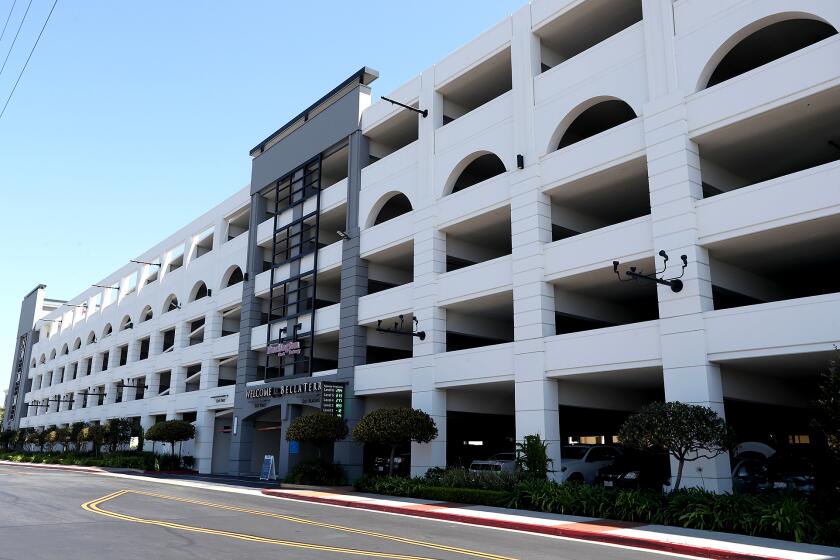Newport Beach council beefs up anti-camping law, adds cops to homelessness team, ends mobile health service

The Newport Beach City Council on Tuesday unanimously voted to beef up anti-camping laws, assign more police to respond to calls involving homeless people and also ended the city’s contract with the nonprofit running its mobile mental health and wellness service.
Changes to two city ordinances that were approved this week make it illegal to store belongings unattended on public property, “sleep or lay down” in a public restroom, bench or bike rack, or to obstruct access to EV charging stations and ATMs. They also expand the city’s definition of camping to include sleeping overnight in an automobile.
Council members also gave the green light to a plan to assign more police to handle calls involving homeless people. It currently has one homeless liaison officer that conducts outreach and issues citations. Beginning in December, they will be joined by three other officers and split into two “quality of life teams” working seven days a week. Officials also hope to add another three officers to the team in early 2025 and are considering designating a city attorney to prosecute anti-camping laws on a full-time basis.
The city declined to extend its contract with Be Well, the nonprofit that has been operating a mobile mental health response team in Newport Beach since 2021, when a $1.2-million contract was approved by the City Council. The service was available to everyone in the city, not just homeless people. But it was also tasked with outreach and helping people apply for housing and other forms of support.

“As it comes to Be Well, it’s an approach that’s worked,” Mayor Pro Tem Joe Stapleton said, “[but] it hasn’t worked well enough. It hasn’t worked fast enough. Mental health is a problem in this community.”
Other were more critical of the nonprofit including Councilwoman Robyn Grant. However, she and Stapleton described homelessness as a regional issue and expressed interest in joining other cities to support and fund mental health and outreach services collaboratively.
The updates on Newport Beach’s policies on homelessness come in the wake of a June Supreme Court decision in favor of the city of Grant’s Pass, Ore., which allows local governments to enforce anti-camping laws and clear encampments whether or not shelter beds are available. It’s a reversal of a 2018 decision in the U.S. Court of Appeals that found arresting or citing people for camping in public when they had nowhere else to go amounted to cruel and unusual punishment.
About a dozen Newport Beach residents gave public comment and expressed support for stricter enforcement of anti-camping laws against homeless people on Tuesday. Some accused people living on the streets of causing disturbances with homeowners, businesses and tourists, public defecation, drug use and theft. Many said they didn’t feel safe because of the presence of homeless people in Newport Beach, and several speakers alleged homeless people refused to get help.
Most members of the council echoed those sentiments, and characterized tougher enforcement of anti-camping laws as a means to compel homeless people into shelters as well as mental health and addiction treatment.
“You have to have a zero tolerance policy for any vagrance, and this comes from the mother of somebody who’s been homeless,” recent Newport Beach resident Jennifer Hoff said. “Our police are made to be street corner psychiatrists because of current laws in place that prohibit families like mine from getting their loved ones in a psychiatric hospital for more than 48 hours.”
The city has an arrangement with the Costa Mesa Bridge Shelter, reserving 25 beds for people living on the street in Newport Beach.
According to the most recent Point in Time data revised by the county in May, more than 70 people were living on the street in Newport Beach. The city has an agreement to reserve 25 beds at the Costa Mesta Bridge Shelter, and those are constantly at or near capacity.
Homeless people in Orange County say they aren’t able to get a spot at local shelters due to a lack of space, according to a 2023 survey by the county’s commission on homelessness. Some also said they don’t feel safe at the communal living arrangements, and rules at many shelters in the area make it difficult to get a spot if they work odd hours, have pets or are trying to stay united with loved ones.
All the latest on Orange County from Orange County.
Get our free TimesOC newsletter.
You may occasionally receive promotional content from the Daily Pilot.




